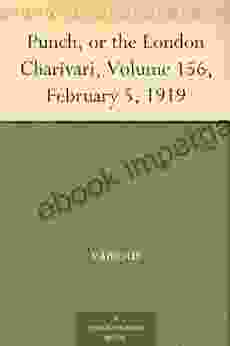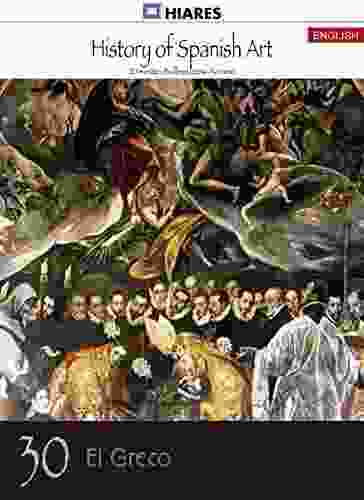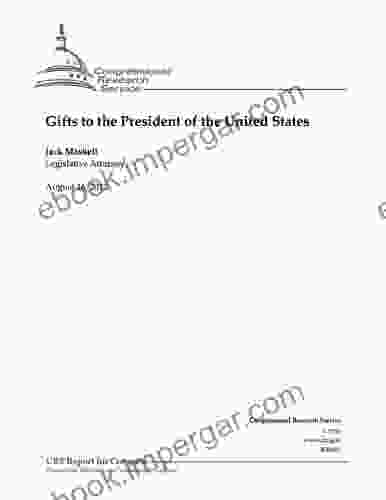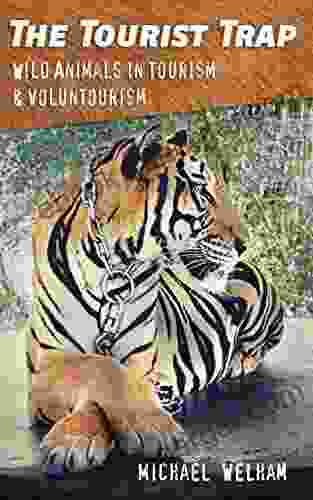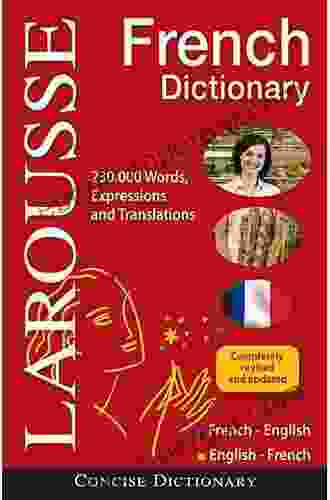Punch, or the London Charivari: A Weekly Journal of Humor and Satire, Volume 156, February 1919

Punch, or the London Charivari, was a British weekly magazine of humor and satire published from 1841 to 1992. It was one of the most popular and influential magazines of its kind, and its pages featured some of the greatest writers and illustrators of the Victorian and Edwardian eras.
5 out of 5
| Language | : | English |
| File size | : | 151 KB |
| Text-to-Speech | : | Enabled |
| Screen Reader | : | Supported |
| Enhanced typesetting | : | Enabled |
| Word Wise | : | Enabled |
| Print length | : | 43 pages |
| Lending | : | Enabled |
This particular volume, published in February 1919, contains a wealth of witty and incisive commentary on the events of the day. The war had just ended, and the world was in a state of flux. Punch's writers and illustrators captured the mood of the times perfectly, with their sharp wit and keen eye for the absurd.
Some of the highlights of this volume include:
- A cartoon by Bernard Partridge showing the British lion emerging from the war victorious, but with a look of weariness and disillusionment on his face.
- A satirical poem by A. P. Herbert about the difficulties of returning to civilian life after the war.
- A series of articles by H. G. Wells about the future of the world, in which he predicted the rise of fascism and the outbreak of World War II.
Punch, or the London Charivari, was a unique and important publication that played a significant role in British culture. This particular volume is a valuable historical document that provides a fascinating glimpse into the world of the early 20th century.
Table of Contents
- The War and Its Aftermath
- The Rise of the Labour Party
- The Future of the World
- Social and Cultural Change
- Punch's Literary and Artistic Legacy
The War and Its Aftermath
The war had a profound impact on British society. Punch's writers and illustrators captured the mood of the times perfectly, with their sharp wit and keen eye for the absurd.
One of the most striking cartoons from this period is Bernard Partridge's "The British Lion After the War." The cartoon shows the lion emerging from the war victorious, but with a look of weariness and disillusionment on his face. The lion is surrounded by the ruins of war, and he is holding a broken sword. The cartoon perfectly captures the mood of the British people after the war. They were victorious, but they had also paid a heavy price.
Punch's writers also explored the difficulties of returning to civilian life after the war. In a satirical poem entitled "The Returned Hero," A. P. Herbert describes the plight of a soldier who returns home to find that his wife has left him and his job has been taken by someone else. The poem is both funny and heartbreaking, and it perfectly captures the sense of displacement and disillusionment that many soldiers felt after the war.
The Rise of the Labour Party
The war also had a significant impact on British politics. The Labour Party, which had been founded in 1900, emerged from the war as a major political force. Punch's writers and illustrators were quick to satirize the rise of the Labour Party, but they also recognized its importance.
One of the most famous cartoons from this period is H. M. Bateman's "The Labour Party: A New Dawn." The cartoon shows a group of Labour MPs emerging from a dark tunnel into the light. The MPs are all wearing red ties, and they are carrying banners that say "Socialism" and "Workers of the World Unite." The cartoon is a powerful symbol of the rise of the Labour Party, and it perfectly captures the hopes and aspirations of its supporters.
The Future of the World
Punch's writers and illustrators were not only interested in the present; they also looked to the future. In a series of articles entitled "The Outline of History," H. G. Wells predicted the rise of fascism and the outbreak of World War II.
Wells was a brilliant writer and thinker, and his predictions were remarkably accurate. In his articles, he warned that the world was heading towards a new era of conflict and upheaval. He also predicted that the Soviet Union would become a major world power, and that the United States would emerge as the dominant force in the world.
Wells's predictions were not always accurate, but his articles were a valuable contribution to the debate about the future of the world. He was one of the first writers to recognize the dangers of fascism, and he warned that the world needed to take action to prevent another war.
Social and Cultural Change
The war also had a significant impact on British society. The war accelerated the process of social and cultural change, and Punch's writers and illustrators were quick to satirize the new trends.
One of the most striking cartoons from this
5 out of 5
| Language | : | English |
| File size | : | 151 KB |
| Text-to-Speech | : | Enabled |
| Screen Reader | : | Supported |
| Enhanced typesetting | : | Enabled |
| Word Wise | : | Enabled |
| Print length | : | 43 pages |
| Lending | : | Enabled |
Do you want to contribute by writing guest posts on this blog?
Please contact us and send us a resume of previous articles that you have written.
 Book
Book Novel
Novel Page
Page Chapter
Chapter Text
Text Story
Story Genre
Genre Reader
Reader Library
Library Paperback
Paperback E-book
E-book Magazine
Magazine Newspaper
Newspaper Paragraph
Paragraph Sentence
Sentence Bookmark
Bookmark Shelf
Shelf Glossary
Glossary Bibliography
Bibliography Foreword
Foreword Preface
Preface Synopsis
Synopsis Annotation
Annotation Footnote
Footnote Manuscript
Manuscript Scroll
Scroll Codex
Codex Tome
Tome Bestseller
Bestseller Classics
Classics Library card
Library card Narrative
Narrative Biography
Biography Autobiography
Autobiography Memoir
Memoir Reference
Reference Encyclopedia
Encyclopedia Kenneth P Werrell
Kenneth P Werrell Kevin Vost
Kevin Vost Kevin Leman
Kevin Leman Keren Yarhi Milo
Keren Yarhi Milo Ken Wharfe
Ken Wharfe Kelsey Chittick
Kelsey Chittick Kenneth M Lamaster
Kenneth M Lamaster Kevin Handreck
Kevin Handreck Kenneth A Daigler
Kenneth A Daigler Kendall R Phillips
Kendall R Phillips Kevin Garnett
Kevin Garnett Kindle Edition
Kindle Edition Kimberly Morrow Leong
Kimberly Morrow Leong Keng C Wu
Keng C Wu Kevin Hand
Kevin Hand Kevin Baker
Kevin Baker Kevin Flynn
Kevin Flynn Kevin Hallock
Kevin Hallock Kent Sterling
Kent Sterling Kevin L Williams
Kevin L Williams
Light bulbAdvertise smarter! Our strategic ad space ensures maximum exposure. Reserve your spot today!

 Rodney ParkerOn the Philosophy of Marxism-Leninism-Maoism-Sison Reader: A Revolutionary...
Rodney ParkerOn the Philosophy of Marxism-Leninism-Maoism-Sison Reader: A Revolutionary... Stephen FosterFollow ·9.2k
Stephen FosterFollow ·9.2k Jamison CoxFollow ·15.9k
Jamison CoxFollow ·15.9k Vincent MitchellFollow ·11.4k
Vincent MitchellFollow ·11.4k Hunter MitchellFollow ·14.5k
Hunter MitchellFollow ·14.5k Greg FosterFollow ·15k
Greg FosterFollow ·15k Chadwick PowellFollow ·18.5k
Chadwick PowellFollow ·18.5k John SteinbeckFollow ·5.3k
John SteinbeckFollow ·5.3k Luke BlairFollow ·19.8k
Luke BlairFollow ·19.8k

 Chadwick Powell
Chadwick PowellDiscover the Secrets of Optimal Health with "The Healthy...
Preface: Embark on a Transformative...

 Andres Carter
Andres CarterUnveiling the Profound Journey of Womanhood: A Daughter's...
In the tapestry of...

 Travis Foster
Travis FosterWords to Live By: The Essential Guide to Finding...
Words have the power to shape our...

 Chinua Achebe
Chinua AchebeThe Ultimate Guide for Men to Recover from a Breakup
: Breakups are never...

 Spencer Powell
Spencer PowellNew Mindset, New Results: The Proven Path to Unleashing...
About the Book ...
5 out of 5
| Language | : | English |
| File size | : | 151 KB |
| Text-to-Speech | : | Enabled |
| Screen Reader | : | Supported |
| Enhanced typesetting | : | Enabled |
| Word Wise | : | Enabled |
| Print length | : | 43 pages |
| Lending | : | Enabled |


